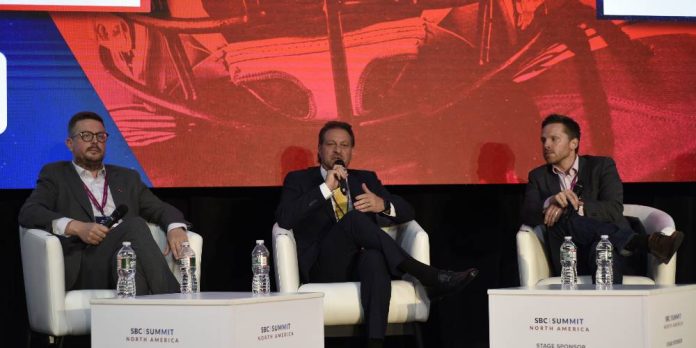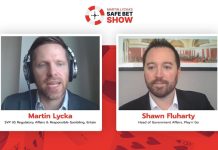The Player Protection Symposium was not the only place responsible gambling was discussed at last week’s SBC Summit North America. Conversations around how the industry can improve the ways they handle problem gambling permeated the entire conference, even taking front and center during Sportradar Jeff Yabuki’s keynote.
These conversations were important and helpful, but one panel was focused specifically on identifying what comes after these discussions. A group of established experts gathered together for “Leadership and player protection – a shift towards solutions”. They addressed a number of questions including where are our responsible gambling efforts now and where do they need to go?
Data drives latest responsible gambling developments
The panel, moderated by Bill Pascrell III, featured a combination of civil servants those in the gambling industry on the risk management and compliance side.
New Jersey Division of Gaming Enforcement (NJDGE) Chair Director David Rebuck kicked off the discussion with the latest innovations taking place around data.
While some on other panels tiptoed around the data issue, Rebuck was point blank in how large a role it plays in gaming, particularly responsible gambling.
“In the online gaming world, everybody in this room should understand that all aspects of data that are wagered on–the behavior, the deposits– are recorded and tracked forever. There is no privacy in that area,” Rebuck said. “This data, as we all know from our use of the Internet, is tracked in many ways by the operators, be it Amazon, Google, or even the gaming operators to know what your behavior is and how to sell their product. We’re taking it to a new extreme. We’re not interested in you selling your product as marketers. We’re interested in you having a responsible gambling team that tracks the information, monitors, and intervenes when risk behavior occurs as a best practice.”
The data’s scope goes beyond just RG checks and in-app gambling protections. In New Jersey, the most mature sports betting and online casino market, that data is being put to good use from a research perspective. Rebuck is particularly proud of the fact this research is funded by the industry.
“Now you have Harvard, sponsored by Entain, Yale University Medical School sponsored by Mohegan Sun. In New Jersey, I take great pride in Rutgers University, six years now going on seven years, is doing academic research on every component of internet and sports wagering engaged in by anybody in New Jersey. The data that is supplied to them is unbelievable. And then use that data then to provide solutions that you can look at and test with your action plans.”
Scope of RG goes beyond just casino and sports betting account activity
The DGE is able to require these practices as the state regulatory body, but similar intiatives are happening without the pressure of regulatory mandate. Declan Raines, Head of US Gaming for TransUnion, described some of the intiatives his company help gaming partners with using data and behavior beyond just deposits and withdrawals.
“[Operators] had very powerful datasets for identifying risky, addictive and problematic behavior, but it was all built on their own first party data. They wanted to enhance that with consumer insights that could identify this behavior before a problem, before someone self-excludes, or other negative consequences from gambling. And so what we did is we started to look at what are the consumer signals that are indicative of problematic behavior,” Raines explained.
By using additional information like a credit report, operators can look beyond just gambling behavior for signs of potential problems.
“If you have been declared bankrupt in the last seven years, the addictive nature of that data point and how it impacts your gambling. There is a very high relationship between problematic behavior and recent bankruptcies,” Raines pointed out.
Founder and CEO of Epic Risk Management Paul Buck was quick to agree with Raines. Epic works with a range of groups, not just gamblers. He sees ties across the financial sector, sports leagues, the criminal justice field, and even the armed forces in addition to operators and gambling entities. Risk takes many forms and when risky behavior is detected in one field, it can be a sign there is a need to provide support or limitations in another arena.
With the potential for several extremely negative outcomes for people battling with addiction, Buck reiterated what most in gaming already know: you have to get to the person in advance of the problem. If not, the results are life-threatening.
“You know, it’s far better if you’re stopping people getting to the edge of the cliff rather than going off the cliff and then get the journey back,” Buck explained. “There are four main places where people end up if gambling gets out of control and becomes a problem. A bankruptcy is one. Mental health problems, suicide, or suicide attempts, which a lot of my team our team have had suicide attempts, criminal convictions or breaking the law, or a relationship with fail.”
Are we learning enough from European responsible gambling mistakes?
The industry is making great strides, but everyone on the panel agreed there is more to be done. Particularly when it comes to learning from what the UK and other European markets got wrong and are now paying the price for in terms of new laws and restrictive regulations.
Entain’s SVP of American Regulatory Affairs and Responsible Gambling Martin Lycka has extensive experience in both markets and thinks we could be at a turning point.
The stars now have stopped it might be they are aligning, because we’ve got the legislators and the regulators on board, and there’s a lot of acceptance throughout the industry that there are lessons, good or bad, to be learned from the European experience including on the athletes side of things,” Lycka predicted.
“And to be fair, a number of other industry operators have started walking the walk as opposed to just talking the talk. Once again, all of us that were originally the UK industry would be to blame for that. Three, four, or five years ago, we had a massive eye opener and realized that actually doing Responsible Gambling and doing it well. It’s not only the right thing to do, and it’s also a very smart business decision.”
The fiscal costs of doing RG right
Lycka is correct. Most, if not all, of the industry concedes a robust and sincere responsible gambling platform is more than just a social service, it is a key to sustainability.
However, it remains a topic that is chronically underfunded. Operators and B2B companies fund their own RG efforts and are doing more like subsidizing studies, but finding a source of funding for social programs and government programs remains a struggle.
Rebuck pointed out very plainly that other forms of gambling, such as the lottery or the horse racing industries, do not do nearly the same level of work to help aid problem gamblers. He would like to see them contribute more financially to his programs in New Jersey.
He also has a very simple solution that could help every state with sports betting address this growing issue.
“We all know in the sports wagering industry, our friends in the federal government take a nice little piece of the pie, a nice excise tax, which is equivalent to about 5% of gross gaming revenue. That’s decimal dust to the federal government but that’s big money when it comes to grants and support for the nonprofits that need the assistance to do the work they are required to do and assist the states in providing some treatment to vulnerable populations,” Rebuck said.
NY’s Addabbo has an ABC approach
Rebuck has years of experience to help push newer measures across the regulatory finish line. State Sen. Joseph Addabbo of New York faces a tougher struggle to get lawmakers, social services, and constituents to realize New York responsible gambling and gambling expansion go hand in hand.
As he tries to lay the groundwork for online casino legalization, he is simultaneously pushing to have the support in place to help problem gamblers and to educate the state’s population.
He branded his approach his “ABCs”:
“The A is awareness. We have to make people aware that we have programs out there, free programs in New York that address the addiction issue, both pre-addiction and addiction issues. The awareness of the program is awareness of what targeted groups we have to address–the younger residents, the college age, the ethnic background, because we’re quite diverse in New York.”
“The B is the budget part. The funding of these programs for pre-addiction and addiction to make sure that Oasis, our agency, has enough funding to increase staffing levels so that we can get to 24/7 in terms of live operator addiction, answering the calls, and answering the people coming forward with the addiction.”
“And the C is codifying legislatively what we need to do to address addiction…Recently, this past legislative session, we passed the Problem Gaming Advisory Council, hopefully Gov. Hochul will sign this into law where we now have a full time council to meet minimum twice a year to understand what we need to do as a state as we expand game.”
What was unsaid in this panel but became readily apparent as everyone spoke is that the key to making headway in responsible gambling measures is collaboration. It is about lawmakers, regulators, operators, experts, and even other industries coming together to support the effort and attack it from every front.














